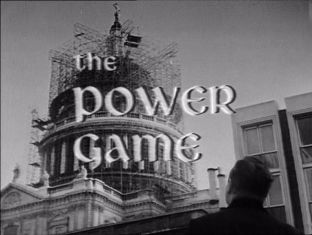

Monday 12 December 1966
”Where Do I Want To Go?” Writer Peter Draper Director David Reid.
”This time you really could get the chop!” Caswell Bligh.
The final figures for the M23 Motorway Construction venture show that Bligh Construction has made a massive profit. A profit so large that the Public Accounts Committee will ask if Bligh’s overstated the tender. As Wilder prepares his defence, Stephen Gray (Guy Doleman) returns from America to investigate the affair, and to ask Susan Weldon (Rosemary Leach) to decide between him and Wilder. Meanwhile, Don Henderson (Jack Watling) is nowhere to be found.
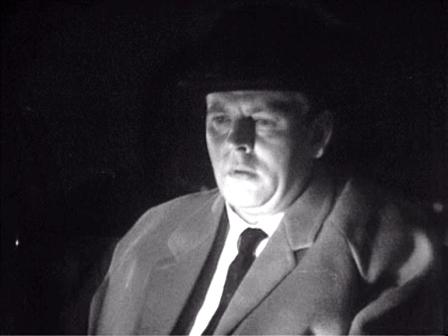
Sitting in the back of a taxi cab, ”Where do I want to go?” is the question a drunken Don Henderson asks in the opening shot. The question equally applies to Susan Weldon’s dilemma in her relationship with Sir John Wilder. Peter Draper’s final script for the series lays the ground for the climactic final episode. The resentment which Don Henderson has manifested since the opening episode of this second series, now flares up into a full-scale depression. Susan Weldon, on the other hand, is forced to take control of her life and make a decision about her future.
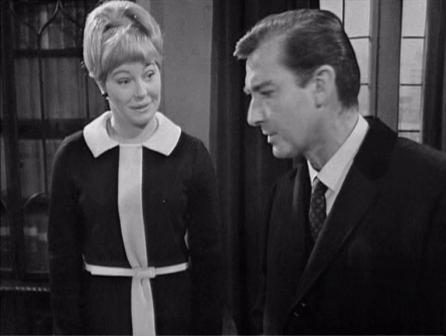
Draper’s script is slightly compromised by the intervention of a new character – Stephen Gray, played by Guy Doleman (Colonel Ross in the Harry Palmer films). Draper had introduced the character of David Main (Patrick Allen) in the second episode, “Ambassador Status” and it would arguably have been more convincing to have Main return in this episode. If that was Draper’s intention, scheduling problems may have intervened. Nevertheless, the employment of the sardonic Guy Doleman as a character threatening Wilder on both professional and personal levels does provide Wymark with a suitably powerful opponent. The script also allows Doleman to display a more charming side than his usual film roles.
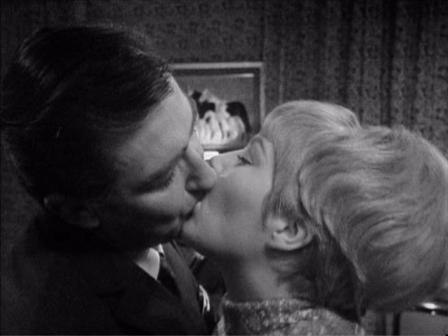
As an officer of the Auditor General’s office, Gray has been recalled to ask questions about Bligh Construction’s profit on the M23 job. Kenneth Bligh (Peter Barkworth) is outraged that a firm could be criticised for making a profit (“The Side Of the Angels” had explored the likelihood of making a loss on public projects) but his father tells him that their competitors would be the first to complain that Bligh’s took an unfair advantage in the bid. Wilder tells him that “the image that we present is that we FAILED. Oh we may have made a million pounds profit, but in this instance as far as public morality is concerned, we failed.”
In preparation for the inevitable investigation, Wilder gets the auditors in to examine the project, “I want the figures that got lost because accounts came in late and when they did come in they were slipped into another budget to save doing it again. Cash flows that covered two projects at once. Any item of expenditure that might have possibly slipped over to another balance. You might also try to get a figure for the materials the men half-inched on the job.”
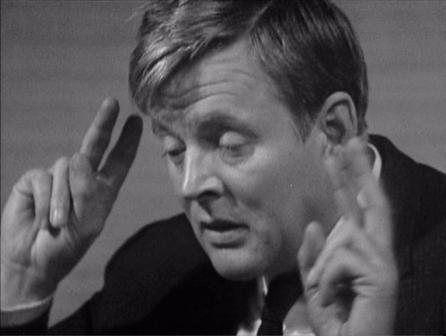
"QUOTE – You can always tell a man by the company that keeps him. UNQUOTE”. Jack Watling, as a drunken Don Henderson, demonstrates an early use of the four finger quote gesture
Don Henderson continues to be frustrated by his role, feeling like he’s been at a party for the last eight years, “always waiting for Father Christmas to come and bring me my balloon and orange. “. Don is also increasingly irritated by Wilder’s behaviour. He tells Ken Bligh that there was a time when Wilder, “was about the best boss possible to have. He was fair. He was direct, and he was honest. Now all he cares about is success.” During a drunken lunch with Pamela Wilder (Barbara Murray) Don recalls his father, dying of cancer but planting roses that he knew he’d probably never live to see bloom. “How could he have done that,” he asks, “without crying his heart out over every spadeful?”
Another character whose ambiguous attitude to Wilder has seen her vacillating throughout the second series is Susan Weldon: “While your wife was away, you hardly ever came near me. Now that she’s back you start asking me out to lunch.” Rosemary Leach is totally convincing, whatever conflicting emotion she displays. When Stephen Gray appears at her flat she greets him joyfully but is also apprehensive. As if on cue, Wilder appears, walks into the flat and quickly sizes up the situation. With excessive politeness, Wilder says, “I’m terribly sorry, I didn’t realise you were having a party.” Calling Susan “Darling” he tells Gray he’s glad to meet him as he’s heard so much about him and smarmily asks, “How do you like the flat? I’ll warn you it’s a hell of a high rent in this area.” As Wilder departs Susan furiously tells Gray that Wilder doesn’t pay the rent and never has done, “I just can’t get the key back off him.” Gray coolly observes that she could always change the lock.
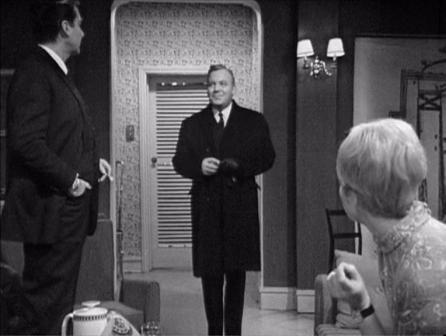
Susan sums up her conflicted feelings towards Wilder when she tells him, “I thought I was in love with you. I really did. And I was so prepared to be in love with you that I was willing to overlook all the issues you always seem to bring with you.” Her only defence is to be brusque, symbolically lighting her own cigarette when Wilder offers his lighter.
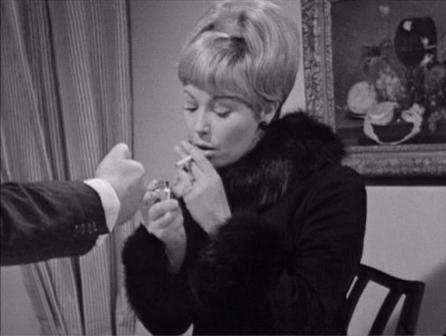
Wilder tries to sink any investigation into the M23 project by telling an opposition MP that Gray and he “share a mistress” and that Gray is motivated by malice. He also primes Don to let Susan know what he’s done. But when Wilder arrives at Susan’s flat, Gray tells him that there will be no scandal. He and Susan are to be married. Like a pantomime demon king, Wymark frustratedly raises his fist holding the key to the flat and Dolman purrs, “yes, you can return the key or throw it away. The lock is being changed in the morning.” Wymark and Leach share one brief parting look before he walks out. Stephen Gray reads the moment well by commenting, “Oddly enough, you know, at times you have to prevent yourself feeling sorry for him.”
Director David Reid ends the episode with a shot of Wilder closing the connecting door between his office and Don’s. The shot is framed through the wicker waste basket into which Don has emptied some papers before going on a long weekend. Wilder has also tossed the key to Susan’s flat in the basket. As the final episode approaches, he appears to be closing the door on two relationships.
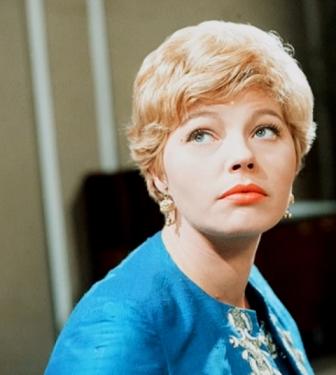
The motorway in this episode is fictional – the M23 from Surrey to Sussex was not completed until 1974. The naming of the motorway is perplexing. Earlier episodes had dealt with an M27 motorway (again, the real-life M27 was not built until 1972). This was the motorway Frank Hagadan’s machine was built for in “The Crunch” – the noise from the M27 construction work led the Wilder’s to temporarily abandon their suburban house in “Grounds For Decision”. Even Wilder’s explanation for Bligh’s excessive profit ties in with the M27. It’s not clear whether a different Motorway was purposely used or if it was a simple error.
As in “Tax Return”, this episode echoes an earlier “Plane Makers” episode (“The Firing Line” ), although this time the similarities are acknowledged. “You’ve been through this before,” Caswell Bligh tells Wilder as they discuss the M23 Project, “This Government is not going to be any more pleased than the other was. “
Wilder’s explanation for the profit is the flip-side of the risk over the M27 explained to Ken Bligh in “The Crunch” . Alluding to Frank Hagadan’s invention he says, “We spent £70,000 on developing a machine to do the job more effectively. We took a chance that it would work. If it hadn’t, we’d have had to foot the bill. It did work. So the Government has to foot it. So now you’re trying to wriggle out of it.”
Wilder tells Stephen Gray, “In a time of economic difficulty, a firm which tries to make itself more efficient is penalised.” This is the first episode to openly acknowledge the economic crisis which had begun earlier in the year with a Seaman’s strike hitting exports, attacks on the Pound by speculators, and which had resulted in the imposition of cuts in public spending, a £50 limit on foreign travel and a six months freeze on prices and wages. For the third time, John Wilder had been overtaken by real-life events.